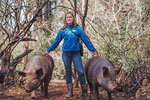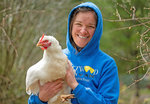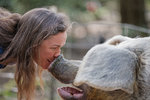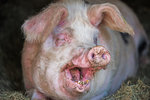




Since its inception in 2017, Heartwood Haven, a 501(c)(3) nonprofit and registered charity on the Key Peninsula, has rescued more than 1,400 farm animals suffering from cruelty and neglect, including pigs, goats, sheep, chickens, ducks, geese and turkeys. After healing and rehabilitation on the 2.5-acre Key Peninsula property, over 1,000 animals have been successfully adopted out, while animals who are not candidates for adoption receive care living out their natural lives at Heartwood Haven.
The sanctuary, co-founded by Executive Director Kate Tsyrklevich and her wife, Director of Operations Hope Hilman, currently houses 15 pigs, about 30 chickens, 20 ducks, eight turkeys, two dogs and three cats.
All the roosters are former cockfighters. Their first was Porter, that Tsyrklevich would take for walks around the neighborhood after he was rescued from a cockfighting ring in another state.
“Typically, what happens is they’re all euthanized,” Tsyrklevich said. “Here they get to die with dignity.”
Once rescued, recovering cockfighters must be housed separately because they might be traumatized, scared and aggressive. One of their roosters self-mutilates due to post-traumatic stress.
“What happens in cockfighting is that those roosters are mutilated, they’re drugged with testosterone and steroids and methamphetamines and various uppers to make them aggressive, to make them want to fight,” Tsyrklevich said. “They’re trained up with trauma, like hitting them with different things, objects to make them more fearful and lash out, so that brings out the fight or flight response in them.”
Non-egg laying chickens, bred to grow huge for the meat industry, require specialized care and sometimes have heart problems.
“All the animals that come here from factory farms, they’re all sick,” Tsyrklevich said. “They all have diseases and need antibiotics and they have respiratory illnesses; it’s gross.”
“A lot of farmers will tell you that you have to butcher (turkeys and chickens) when they’re young to put them out of their misery, otherwise they’re going to be so overweight they can’t walk,” she said. “But I have them here. They’re 4 years old. It’s all about diet, exercise, friends, sunshine.”
Running an animal rescue organization was not always the plan, but for Tsyrklevich, who grew up on a farm in Moldova in the former USSR, it makes sense as the culmination of her experiences.
“There were lots of stray dogs and neglected animals. I would save my lunch for them and go feed, like, the mama dogs that had puppies that needed extra food,” she said. “I was always the kid who took the classroom hamster or rat home for the weekend.”
Before committing to Heartwood Haven full-time, Tsyrklevich worked at a vet clinic, taught community college classes, and was an assistant aquarist and researcher with a background in biological sciences, environmental sciences and oceanography.
Tsyrklevich and Hilman are vegan and part of their mission is to spread compassion through education, including an Animal Friends blog series, tours inviting visitors to pet a pig or cuddle a chicken, and events such as pig painting with a visiting artist. The co-founders work with other sanctuaries and local advocacy organizations and estimate over nine million people have been touched by their work.
Learning that farm animals in most shelter systems are sent to auction propelled Heartwood Haven’s mission forward, leading them to focus on the highest-risk animals.
“Animals that go to auction, especially for pigs, it’s very likely that they’re going to be purchased and slaughtered,” Tsyrklevich said. “If a cat or dog was picked up for being stray or coming from a cruelty situation and animal control sent them off to auction where they’re likely to be butchered for food, people would be outraged.”
Nine giant pigs that can grow to 900 pounds live at the sanctuary. Among the longest-standing residents are 500-pound seniors Ethel and Lucy, a trickster with a spicy personality.
“We don’t call them hogs; we call them big pigs,” Tsyrklevich said. “Hogs, you typically think they’re going to turn into bacon.”
One of their six mini pigs, 200-pound Ruby, couldn’t walk when she was rescued but is now thriving despite ongoing limited mobility and has become a social media star as an ambassador of her species.
“We have a lot of pigs here who, the owners were doing drugs and selling drugs and so there’s drug related murders; they end up going to jail,” Tsyrklevich said. “So, these pigs are abandoned.”
In a recent rescue of three abandoned pigs, two had not had water or food for over 30 days.
Tsyrklevich said pigs are among the smartest animals on Earth, with an IQ of a 5-year-old child. They have a designated bathroom area, decorate their houses and even give gifts, such as leftover food, trash or branches they’ve collected.
“Breeders tell people they’ll make good indoor pets. But they’ll destroy the house, they’ll start biting you, they get bored,” she said. “Take your kid, lock them in a room, lock them inside — it’s the exact same thing.”
Heartwood Haven works with animal control agencies on cruelty, neglect and abandonment cases, resulting in hundreds of new intakes and adoptions each year.
They have an avian vet and a pig vet, but for spaying and other surgeries, Tsyrklevich drives to Oregon State University towing a trailer that can fit 15 big pigs.
“The daily care for all these animals is minimum six hours a day,” Tsyrklevich said. “A lot of them are old and arthritic and have special needs and are on medication. They all have different nutritional requirements, fencing requirements, housing requirements, predator-proofing requirements, space requirements.”
Tsyrklevich and Hilman are contacted every day about animals in desperate situations, sometimes even receiving threats like, “I’ll shoot this pig today if you don’t come.” But until they can adopt out more animals or relocate to larger property, Heartwood Haven does not have the capacity to accept owner-surrendered animals, even in cases with “really, really, really sad stories that jerk at your heartstrings,” Tsyrklevich said.
“All the animals who stay here for a while, they all have their individual personalities,” she said. “When they pass away, you have to cry about it and be sad and upset and remember we’re doing it for them. That’s what kind of fuels you to keep going, just thinking that I made their life better; I can make some other lives better too.”
For more information visit https://heartwoodhaven.org
UNDERWRITTEN BY THE FUND FOR NONPROFIT NEWS (NEWSMATCH) AT THE MIAMI FOUNDATION, THE ANGEL GUILD, ADVERTISERS, DONORS AND PEOPLE WHO SUPPORT INDEPENDENT, NONPROFIT LOCAL NEWS